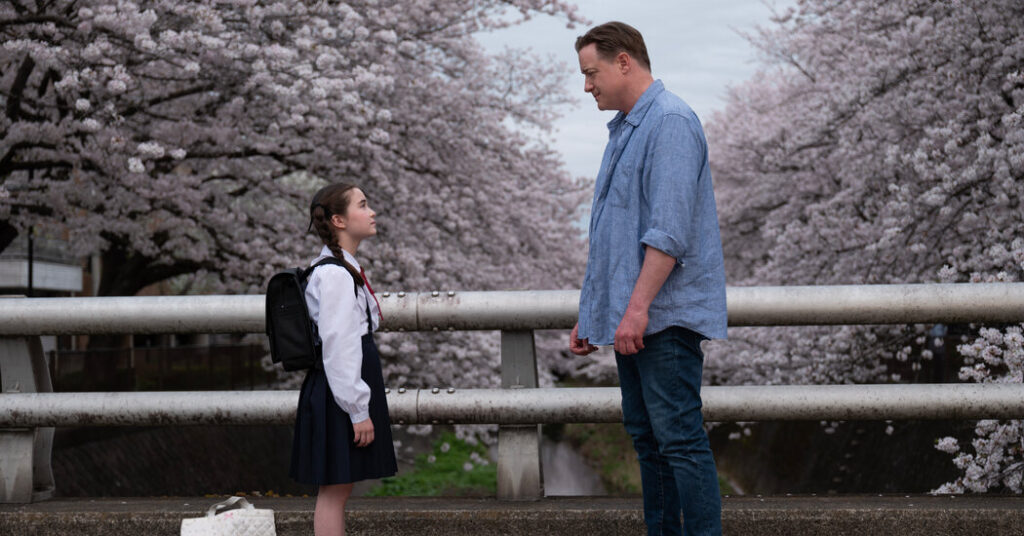When you’re blessed with a face like Brendan Fraser’s, playing wide-eyed wonderment should be a breeze. And in “Rental Family,” that face — round as the moon and pale as paper — is the lodestar of a movie that’s at once disappointingly superficial and utterly charming.
I did not expect to be charmed, given the gloppy sentiment that the director Hikari ladles unabashedly over too many scenes. Yet Fraser (in a role that could not be more different from his Oscar-winning turn in “The Whale” three years ago) and his very fine supporting cast won me over, as did Takuro Ishizaka’s vibrant, glowing images of Tokyo, where the film is set. This beauty makes the plot’s deceptions not just easy on the eyes, but on the conscience as well.
“Rental Family,” though, prefers not to dwell on moral qualms as it follows Phillip Vandarpleog (Fraser), a struggling actor who, after seven years in Japan, remains best known for a ludicrous toothpaste commercial. At night, after yet another fruitless audition, Phillip returns to his pint-size apartment and gazes enviously at the happy families in a neighboring building. Then he’s hired by a company that, like hundreds of real-life Japanese businesses, supplies actors to play critical roles in the personal lives of its clients. His first gig is to impersonate a “sad American” at a funeral, where he is shocked to witness the supposed deceased sit up in his coffin, the better to appreciate a particularly emotional eulogy.
A montage of minor assignments leads to Phillip’s first major role: playing the groom in a traditional Japanese wedding. The bride-to-be needs a counterfeit husband to free her to pursue her true desire without disgracing her parents — who know the marriage is a sham, but care only about saving face. For the first time, Phillip feels uncomfortable with his elaborate role-playing; but his brusque boss, Shinji (Takehiro Hira), persuades him that, in a country where loneliness is endemic and therapy is stigmatized, they are performing an essential social service.
Skimming the surface of a cultural quirk that’s just begging to be mined — none other than Werner Herzog took a stab at it in 2020 — “Rental Family” never allows thorny principles to block its feel-good trajectory. This cursoriness extends to Phillip himself, a blank slate whose lingering in Tokyo is never explained. Yet his humility and pleasure as he navigates the bustling city is deeply endearing: He’s an outsider who understands his clients’ need for connection. The cheery prostitute he sees from time to time (a delightful Tamae Ando) points out that his job is even more personal than hers, and we know what she means: Phillip is proving unable to maintain professional boundaries.
Nowhere more so than on his primary assignments: to act as the long-gone father of a biracial preteen (Shannon Mahina Gorman) who needs two parents to earn a place at an elite school, and to impersonate a journalist seeking to interview an aging actor who’s sliding into dementia and fears irrelevance (the renowned Akira Emoto).
As Phillip becomes inextricably involved with both clients, he begins to believe in, and feed on, his own artifice. This is uncommonly rich psychological terrain, but “Rental Family” remains committed to selling its premise as a slightly loopy yet emotionally beneficial custom, while banishing its more ragged ethical concerns — like honesty, homophobia and discrimination against single parents — to the sidelines.
Only two scenarios touch on the dark side of duplicity. In one, we finally see the wreckage that lies behind Shinji’s mask of enthusiasm for his business. And in the other, Phillip’s testy co-worker (a fabulous and shamefully underutilized Mari Yamamoto) reveals her revulsion for repeatedly playing a penitent mistress who apologizes to heartbroken wives in lieu of their cowardly husbands. Both instances feel like missed opportunities for the script to go deeper and richer.
Reveling in a lovely, ethereal score by Jónsi (the lead singer of Sigur Rós) and Alex Somers, “Rental Family” is as sweet and tender as spring lamb. “We sell emotion,” Shinji tells Phillip, and we can imagine his director nodding along.
Rental Family Rated PG-13 for a pragmatic prostitute and a mild make out. Running time: 1 hour 43 minutes. In theaters.
The post ‘Rental Family’ Review: Lost in Impersonation appeared first on New York Times.




